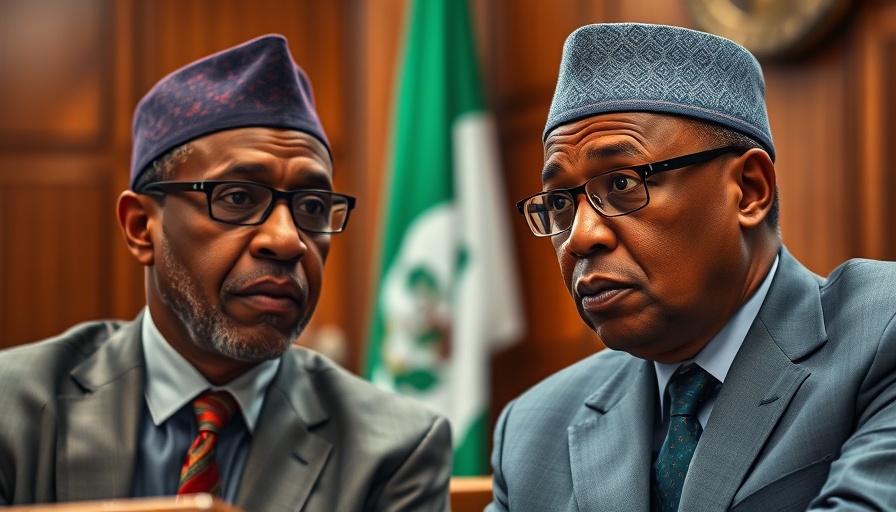
The Bold Move: Ending Fuel Subsidies in Nigeria
In a dramatic shift aimed at reducing government expenditure, President Bolasu announced the removal of fuel subsidies in May 2023. This decision was characterized as a bold and fiscally responsible initiative to conserve finances and cut borrowing costs—an action that is rare in many African nations. However, as we now approach the two-year mark since this policy enactment, a paradox has emerged: the government has resorted to fresh loans and credit facilities to mitigate the adverse economic impacts of this very decision.
In Examining Fuel Subsidy Removal and Government Borrowing, the discussion dives into Nigeria's economic landscape, exploring key insights that sparked deeper analysis on our end.
The Complex Economic Reality
Financial expert Alistister Wilcox and public affairs analyst Professor Simon Na recently joined discussions scrutinizing the complexities surrounding this issue. Wilcox pointedly observed that although the government claims that subsidy removal has liberated funds for capital project investments, public perception remains starkly different. Many Nigerians report facing higher prices without any visible improvements in their daily lives. Indeed, Wilcox highlighted the necessity for more transparent communication from the government regarding the rationale behind its borrowing policies. While every nation borrows to fund critical areas, the discrepancy between what funds are available and where they are allocated remains troubling.
The Narrative Lost?
The perceptions of the populace echo concerns articulated by Professor Na, who argued that the government has clearly lost the narrative post-subsidy removal. Initially, Nigerians were led to believe that the funds saved from subsidies would significantly aid development, yet many are left feeling neglected as they grapple with rising costs. Na emphasized that the government’s plan was framed as a means to liberate itself from the IMF’s fiscal constraints, but instead appears to have precipitated a new cycle of borrowing—adding to citizens' frustrations.
Borrowing: Fiscal Cushioning or Short-Term Fix?
Discussions took a critical turn when analyzing whether the government's approach to borrowing—particularly for wage increases, subsidies, and transport schemes—constitutes an intelligent fiscal strategy or merely a temporary palliative solution. Wilcox expressed skepticism about the effectiveness of these measures, noting that they reflect a larger pattern of fiscal mismanagement. In economies like Nigeria's, macroeconomic indicators may stabilize, yet this reverberates less in the ground realities that citizens experience on a daily basis.
The Role of State Governments
The dialogue also underscored an essential element often overshadowed in discussions about federal policies: the essential function of state governments. Despite receiving significant allocations, the lack of accountability and transparency at these levels raises critical questions about how funds are utilized. Wilcox suggested that discussions focusing solely on federal policy ignore the responsibilities and capabilities of state governments, which could hold the answer to local economic challenges.
The Role of Accountability and Transparency
For both analysts, the lack of proper accounting in the management of public funds emerges as a central issue. During discussions, it was suggested that a continued lack of transparency may breed skepticism among citizens. Poorly managed expectations and promises made by the government weaken public trust, leaving many disillusioned as they witness continued rising costs without adequate justification for economic policies.
Future Trends: Can Reform Reshape the Narrative?
Looking ahead, there remains hope that a concerted emphasis on accountability, effective policy implementation, and clear communication may reshape the narrative around fuel subsidies and government borrowing. As national conversations gather steam, the pressing questions will remain: How will the government reduce borrowing in a fiscally responsible manner while enhancing quality of life for its citizens?
Through this analytic lens, it’s imperative that citizens and policymakers alike hold their government accountable not just for financial promises, but for tangible outcomes that improve daily living conditions across the board. As discussed in Examining Fuel Subsidy Removal and Government Borrowing, the paradox of Nigeria’s economic reality post-subsidy removal illustrates the critical importance of responsible financial governance in the broader narrative of national development.
 Add Row
Add Row  Add
Add 


Write A Comment